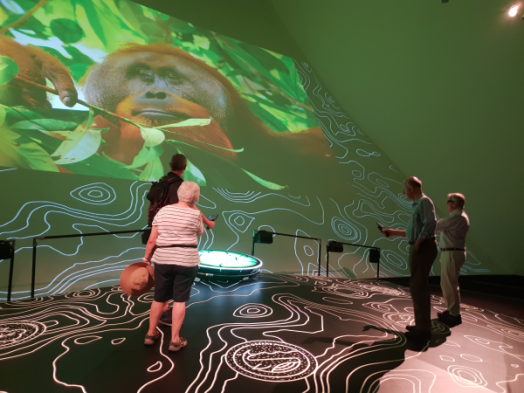Call for Participation
This workshop invites researchers and industry practitioners designing Virtual Reality and Augmented Reality applications for positive social impact to join us at OzCHI 2019 in Perth, Australia, to discuss the research and industry landscape and identify opportunities for collaboration with like-minded professionals. Participants will have an opportunity to share their experiences with other attendees, and to discuss the challenges they have experienced in working with VR and AR applications. This workshop will aim to help researchers to overcome these challenges and, as an outcome, plans will be made for future workshops to establish and promote this topic as a long-term research focus for researchers in Australasia.

Background to the Workshop
Virtual Reality and Augmented Reality (hereafter referred to as “VAR”) technologies have developed rapidly in recent years and are now highly accessible to both research and industry. VR is becoming more affordable and more portable with the release of untethered devices such as the Oculus Go and the Oculus Quest. These devices make research and evaluation of VR applications in the field much simpler. In industry, many organisations and individual developers have noticed VAR’s attraction for the public and have developed immersive experiences targeting greater engagement and positive social impact in relation to topics including climate change, public health, and education.
These developments mean that organisations have moved rapidly to adopt and deploy VAR with relatively little research guidance. However, there is a need for structured and focused research to help provide a solid evidence base for using VAR to achieve social impact. For example, organisations like the United Nations have used VR in high-level decision-making meetings but the nature and extent of its social impact is unclear. In Australia, organisations such as the Australian Conservation Foundation and Indigilab are also engaged in creating VAR content aimed at positive social impacts and could benefit from research partners to provide ongoing research support. Researchers in HCI are in an ideal position to undertake structured design and evaluation which will help to guide and assess the positive social impacts that VAR may bring to real-world problems such as climate change, health and well-being, education and training.
The rapid development of the VAR technology landscape has provided an immense opportunity for partnerships between industry and research. The mobility and accessibility of these devices has also opened the gates for more interdisciplinary work. This workshop seeks to explore the existing trends in VAR research and industry, extend previous workshop outcomes on VAR for ‘good causes’ and provide opportunities for local industry and researchers to come together for positive social impact initiatives.

Workshop Goals
- Explore the landscape of current research and practice in VAR for positive social impact.
- Bring together diverse community members working in VAR technologies for positive social impacts.
- Discuss the use cases in which VAR technologies are likely to be impactful (What does VAR bring over and above other technologies, and what are the mechanisms that make it useful for positive social impacts?).
- Understand the challenges and potential solutions in VAR research and practice in this area.
- Foster discussions and potential collaborations between research and industry.
- Ask how HCI can best provide research support to organisations already developing these technologies in terms of human-centred design and evaluation.
- Discuss practical questions around implementing VAR.

How to Submit
We invite researchers and industry partners to submit a one-page paper that addresses one or more of the following questions:
- What are you working on in VAR and how does your work aim to achieve positive social impact?
- What are some challenges you are facing?
- How will you measure/evaluate positive social impact?
- If you are seeking industry partners, what type of industry partners are you seeking?
- If you are seeking research partners, what research are you looking for to support your work?
Please prepare your paper using the ACM Proceedings Template – see the section on “Interim Template”.
Please use the SIGCHI format if you are using Latex.
Submit your paper via our Easychair: https://easychair.org/conferences/?conf=var4psi
Submission Deadline: 13th October Extended to 20th October.
Notifications to Authors: 27th October
